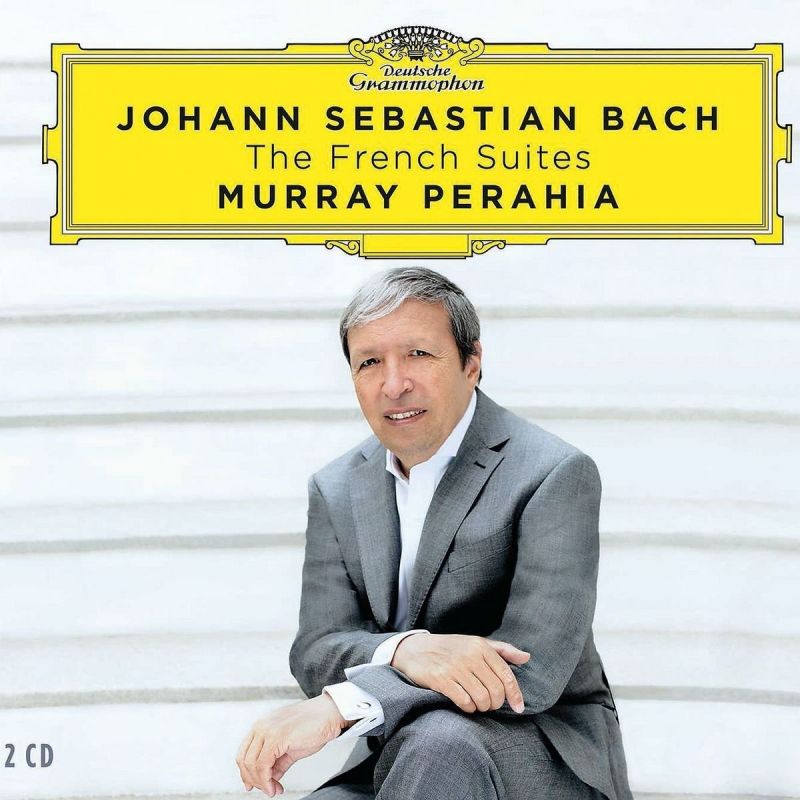JS BACH French Suites Nos 1-6, BWV812-817
View record and artist detailsRecord and Artist Details
Composer or Director: Johann Sebastian Bach
Genre:
Instrumental
Label: Deutsche Grammophon
Magazine Review Date: 11/2016
Media Format: CD or Download
Media Runtime: 92
Mastering:
DDD
Catalogue Number: 479 6565

Tracks:
| Composition | Artist Credit |
|---|---|
| (6) French Suites |
Johann Sebastian Bach, Composer
Johann Sebastian Bach, Composer Murray Perahia, Piano |
Author: Harriet Smith
Recent research shows that, though divorce rates are falling in the UK, there’s an upward trend among the over-50s. The theory is that now we’re longer lived, we’re less inclined to settle for familiar domesticity when we could be off sailing the seven seas. That might account for Murray Perahia – 70 next April – calling time on Sony Classical after an apparently happy marriage of 43 years. So here he is setting off for pastures new with DG; and, honeymoon period or not, the fit looks good with this, his first recording of Bach’s French Suites, pieces that have been in his concert repertoire for decades.
In the booklet interview Perahia reveals that his first encounter with Bach in concert was as a teenager when he heard Pablo Casals conducting the St Matthew Passion at Carnegie Hall. Perahia and Casals, though temperamentally very different, have in common a sense of bringing across Bach the man rather than Bach the god. And that’s particularly pertinent in the French Suites, the most approachable – though no less inspiring or perfectly conceived – of Bach’s keyboard suites.
As we expect from Perahia, everything sounds natural and inevitable. Ego doesn’t come into it: rather, he acts as a conduit between composer and audience with a purity that few can emulate (I’m put in mind of Goode, Brendel and the new boy on the block, Levit). Ah yes, ‘intellectual’ pianists, I hear you mutter. But to describe any of these figures as merely ‘intellectual’ would be to miss out the huge humanity of their playing.
Take the opening Allemande of the Fourth Suite: in Perahia’s hands it’s a sinuous, conversational affair and the way he colours the lines as Bach reaches into the upper register is done with enormous subtlety. Or sample the Sarabande of the same suite, simultaneously intimate yet with true gravity. He brings out the left hand’s largely stepwise motion to a nicety – sometimes reassuring, sometimes questioning.
Perahia is not an artist who takes Bach to extremes: he doesn’t intervene in the way that Maria João Pires or Piotr Anderszewski can do to such mesmerising effect. Take the gigues, for instance. Some take the buoyant Gigue of the Fifth Suite at a more headlong pace, yet Perahia’s feels just so: the rhythms are bright and springy, full of energy without freneticism, and joy is palpable in every note. Or that of the Second Suite, which again sounds completely inevitable, even when he spices it, on its repeats, with dazzlingly daring ornamentation that underlines the inherent dissonances within Bach’s counterpoint. Compared to this, Peter Hill seems a touch staid, Ekaterina Derzhavina somewhat terse, though Pires’s utterly forlorn interpretation is compelling in an entirely different way.
Perahia’s ornamentation could fill the review on its own, for he’s happy to take risks, yet they never sound like risks, so firmly are they sewn into the musical cloth. Sample what he does with the Fifth Suite’s bustling Bourrée, glistening and playful. Or the Anglaise of Suite No 3, which is more unbuttoned in Perahia’s hands than in Angela Hewitt’s precisely imagined account. Preference will come down to personal taste.
With some artists, you have a sense that their personality comes across most strongly in the main structural movements of the French Suites – the opening allemandes, pivotal sarabandes and closing gigues. But one of the delights of this set is what Perahia does with the in-between movements. The Air in the Second Suite, for instance, which succeeds a Sarabande as full of pathos as any reading, twinkles with an easy playfulness; or the Loure of the Fifth, its dotted rhythms rendered with such poetry, Perahia’s ornamentation generous yet never overbearing. Or take the pair of Gavottes from the Fourth Suite, the first purposefully busy, the second a moto perpetuo of sinew and determination, but both having – that word again – a real sense of joy.
Perahia’s pacing is unerring throughout, and even if you tend to favour this movement slower, that one faster, the sense of narrative that he brings to these suites as a whole is utterly persuasive. Again, examples are manifold, but to take just one, try the Courante of the Sixth Suite, its streams of semiquavers and interplay between the hands a thing of delight. At the double bar, before the section repeat and before embarking on the second section, we get the slightest of hesitations, Perahia pausing just long enough to let the music breathe. It’s as if we exhale with him. All this would count for little were we not able to hear him in such beautifully immediate sound. So we should also pay tribute to Perahia’s longtime producer Andreas Neubronner, engineer Martin Nagorni and king among piano whisperers, technician Ulrich Gerhartz.
I’ve only had this recording for five days but I predict a long and happy future in its company.
Discover the world's largest classical music catalogue with Presto Music.

Gramophone Digital Club
- Digital Edition
- Digital Archive
- Reviews Database
- Full website access
From £8.75 / month
Subscribe
Gramophone Full Club
- Print Edition
- Digital Edition
- Digital Archive
- Reviews Database
- Full website access
From £11.00 / month
Subscribe
If you are a library, university or other organisation that would be interested in an institutional subscription to Gramophone please click here for further information.




